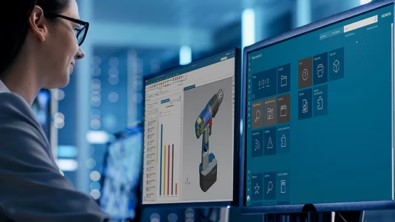Engineering certifications vs. credentials: What’s the difference?

As an engineer, continuous learning is essential to staying ahead of the curve. While a four-year degree provides a strong foundation, additional certifications and credentials can set you apart in the competitive job market. Both certifications and credentials validate your expertise in key topics, demonstrating that you bring real qualifications to the table.
In this blog post, we’ll explore the differences between engineering certifications and credentials, why both matter for your career and how you can start earning them to showcase your skills. By the end, you’ll have a clear understanding of how to leverage these valuable assets to boost your employability and open up new opportunities.
What are engineering certifications?
Engineering certifications are awards that validate your knowledge of specific software, tools or technologies. They are typically offered by the software providers themselves or by professional organizations within the industry. Learning engineering software is a key part of career readiness.
For example, the Siemens Xcelerator Academy provides a range of certifications in their engineering software, such as NX, Simcenter and Teamcenter. These certifications demonstrate your proficiency in using these industry-leading tools, which can be a major asset when applying for engineering roles.
Earning a certification usually involves completing a training course and passing an exam. The certification process ensures that you have a deep understanding of the software or technology, making you a more valuable asset to potential employers.

What are engineering credentials?
While certifications focus on specific software or tools, engineering credentials demonstrate your expertise in broader topics and skill sets. These credentials often cover technical skills, sustainability practices and durable skills like leadership and project management.
Siemens offers a number of credentials through Coursera, covering in-demand skills such as:
- Model-based systems engineering (MBSE)
- Circular product design
- Applied sustainability engineering
- Applied computational fluid dynamics
- And more
Unlike certifications, which are typically awarded by software providers or professional organizations, engineering credentials are often granted by educational institutions or online learning platforms. These credentials demonstrate your commitment to continuous learning and your ability to apply your skills in a variety of contexts.

Why should students care about engineering certifications and credentials?
In today’s competitive job market, employers are looking for engineers who can contribute from day one. Certifications and credentials play a crucial role in signaling your technical expertise and broader problem-solving skills.
Competitive job market: With so many qualified candidates vying for engineering roles, certifications and credentials can help you stand out from the crowd. They demonstrate your initiative, continuous learning and adaptability – all highly desirable traits for employers.
Proven skills: Certifications and credentials show that you have not only the technical know-how but also the ability to apply your skills in real-world scenarios. This gives employers confidence in your ability to hit the ground running and make an immediate impact.
Career flexibility: By earning a mix of certifications and credentials, you can prepare yourself for a wide range of engineering roles. This versatility can open up new career paths and opportunities for advancement, allowing you to pivot as your interests and the industry evolve.
Employability advantage: In addition to technical proficiency, employers value engineers who possess durable skills like teamwork, communication and leadership. Credentials that validate these abilities can give you a significant edge in the job market.
Beyond technical skills: the value of durable skills and interdisciplinary credentials
A successful engineering career is about more than just technical know-how. Employers are increasingly seeking engineers who can navigate the complexities of the real world, collaborate with cross-functional teams and contribute to the broader business objectives.
Engineering requires more than theory and technical skills: While technical expertise is essential, employers also value skills like teamwork, communication and problem-solving. Engineers often work in cross-functional teams, interacting with business leaders, marketing teams and customers. Strong durable skills can help you navigate these interactions and contribute to the overall success of projects, large teams and the organization as a whole.
Leadership and project management: Engineers who understand project management principles can take on leadership roles faster. Many engineering projects involve budgeting, scheduling and risk management – skills that are often overlooked in a traditional engineering degree. Credentials in management can position you for roles like team leads, engineering managers or even executives.
Sustainability and business knowledge: As companies prioritize sustainability and circular economy principles, engineers with knowledge of business strategy, supply chain or finance can bridge the gap between technical innovation and profitability. Credentials in sustainability, like those offered through Siemens on Coursera, can help you align your skills with industry trends and become a valuable asset to your employer.
Competitive edge: By earning a mix of technical certifications (such as Siemens NX or Simcenter) and broader credentials (in areas like leadership, sustainability, and project management), you can demonstrate your versatility and set yourself apart from the competition.
How to earn engineering certifications and credentials
Now that you understand the importance of engineering certifications and credentials, let’s explore how you can start earning them so you can add them to your resume and LinkedIn profile.
Siemens Xcelerator Academy:
- Begin by taking software training courses available to all students for free on Siemens Xcelerator Academy.
- To learn how to gain access to the platform, follow the steps here or watch the video below.
- Once you’ve mastered the tools, such as NX or Simcenter, take the exam to earn your certification through the Siemens training platform.
Coursera and Siemens credentials:
- Enroll in our courses on Coursera that cover topics like MBSE, sustainability and other engineering skills.
- Complete the course, then claim and share your digital credential badge with Credly to showcase your achievement.
Remember, once you’ve earned a new certification or credential, be sure to update your LinkedIn profile and resume to highlight your achievements with Credly. This will help you stand out to potential employers and open up new opportunities.

Engineering certifications and credentials: demonstrate your expertise
Both engineering certifications and credentials play a crucial role in demonstrating your expertise and setting you apart in the job market. Certifications validate your proficiency in specific software and tools, while credentials showcase your broader technical skills, sustainability knowledge and durable abilities.
By taking advantage of the learning opportunities available through platforms like Siemens Xcelerator Academy and Coursera, you can start earning these valuable assets today. Invest in your continuous learning and watch as your employability and career prospects soar.
So, what are you waiting for? Start earning your first certification or credential and take the next step towards an exciting and fulfilling engineering career.


